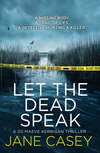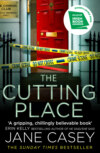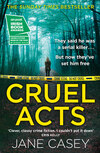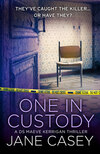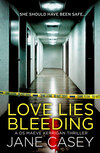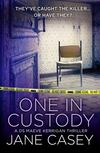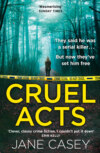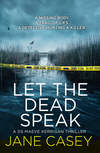Kitabı oku: «Let the Dead Speak», sayfa 6
‘I only know her to speak to.’
‘Have you ever visited her house?’
‘I don’t remember.’
‘You don’t remember,’ I repeated.
‘No, then.’ The amber eyes flicked away from me, darting around the room for inspiration. ‘When we were younger, maybe.’
I sat back in my chair. ‘For someone who managed to avoid being charged with attempted murder, you’re a terrible liar.’
The smile spread over his face. ‘I wasn’t charged with attempted murder because I didn’t do it.’
‘Remember, I’ve spoken to DCI Gordon.’
Turner sat down slowly on the arm of the sofa. ‘What did he tell you?’
‘Everything he found out about you and Ben Christie. Which wasn’t much. Why wouldn’t Ben give evidence against you, William?’
‘Because I didn’t do it.’
‘The incident happened in an alley behind some shops. You were there and Ben Christie was there and Ben ended up with a stab wound in his stomach. It doesn’t take a great leap of imagination to guess what happened.’
‘You could guess, but you’d be wrong.’ Turner’s breathing was still a little fast but his eyes were bright; he was enjoying this.
‘What about the text messages on his phone?’
‘What about them?’
I opened my notebook to read out the exact words. ‘“u know wot u did” “Time 2 make it right” “u can’t back out now” – what was that about?’
‘I don’t remember. Nothing much. Teenage shit. Maybe he spilled my drink or borrowed a quid and didn’t pay it back.’ He yawned. ‘You know you’re talking about something that happened four years ago. I can’t be expected to recall all the details.’
‘He was your friend and he almost died. Of course you remember it,’ I snapped.
Turner lifted his hands and looked at them, turning them over to examine the palms. ‘I was covered in his blood. Did you know that?’
‘I’m not surprised. He was very badly injured.’
‘It was so hot, his blood. It got everywhere. Under my nails. On my shoes. I dream about it sometimes.’ He looked up at me again. ‘I saved his life. I called the ambulance.’
‘You stabbed him.’
‘Not me. I found him. I helped him.’
‘You met him in the alley near your school and you stabbed him.’
‘Did DCI Gordon tell you about the forensics?’ Turner asked, his eyes intent. ‘Did he tell you about the knife?’
‘Yes. He did.’
‘Whose knife was it?’
It was a kitchen knife, an ordinary one with a serrated blade, the kind you might use for cutting up vegetables. Mrs Christie had identified it as one from her house, and cried as she did so.
‘It belonged to the Christies, but—’
‘And whose fingerprints were on it?’ Turner asked.
‘Ben Christie’s.’
‘Not mine.’
‘No. But there are ways of staging that.’
‘I didn’t have to. I never touched it. Did they find my DNA on it?’
‘No.’
‘I’ve read up on DNA. They can do amazing things these days, can’t they? A skin cell or two, that’s all they need to identify someone beyond doubt. And every contact leaves a trace.’
Edmond Locard’s maxim. It was the basic principle of all forensic investigation – that criminals left traces of themselves at crime scenes and crime scenes left traces on the criminals themselves. I wasn’t used to having a suspect quote it at me.
‘So they say. But—’
‘There was no trace of me on the knife. I never touched it. I never held it. I didn’t stab him.’
‘You said yourself you were covered in his blood.’
‘That was after he stabbed himself,’ Turner said dismissively. ‘That proves nothing.’
‘Why would he stab himself?’
‘You need to ask him that.’
DCI Gordon had done precisely that, over and over again. Christie had refused to say. All he had mumbled, over and over again, was that it wasn’t anything to do with William Turner, and no one had been able to prove him wrong.
‘You mean you don’t know? You were there.’ Along with two other teenagers who swore they’d seen Turner helping Christie, calling an ambulance on his phone, cradling his friend and comforting him.
‘I was too late to stop him. I tried. I saved his life. A suicide is a terrible thing.’
‘Says the man who doesn’t care if he lives or dies.’
‘Which reminds me.’ He took out his tin of tobacco again, opening it on his knee this time. ‘Almost time for another coffin nail.’
‘Will-i-am. I wish you wouldn’t call them that.’ The voice came from behind me and I jumped; I hadn’t heard anyone approach. A thin, withered woman stood in the doorway holding a cloth with gloved hands.
‘Mrs Turner?’ I stood up. ‘I’m DS Maeve Kerrigan. I’m here to ask some questions about what happened up the road.’
‘I don’t know anything.’ Her eyes were fixed on her son who was concentrating on his cigarette. ‘Don’t do that in here, William. You’ll drop bits of it everywhere.’
‘Then you can sweep them up.’ He winked at me. ‘Got to give her a reason to live, don’t I?’
Mrs Turner sighed. ‘You’re terrible.’
‘You love it.’
She squeezed the cloth in her hands, still watching him. It was as if I didn’t exist. I could see what William had meant when he said she didn’t notice anything that happened outside their home. DCI Gordon had been forthright about her. ‘She can’t imagine her boy doing anything wrong. She thought I was a bully and a liar. Little Willy never did anything to hurt anyone.’ A snort. In his opinion, Mr Turner had been fully justified in doing a runner before William was born. ‘She had money because her parents were very well off – they bought the house, for instance – but money isn’t everything, is it?’
I had agreed that no, it was not and Gordon had laughed. ‘It helps though.’
‘Sometimes.’
‘Well, Turner didn’t stick around to see his son. Maybe the boy would have turned out better if he’d been around. He had too much attention, that was the problem. He thought he was the centre of the universe because, for his mum, he is.’
‘Do you know Kate Emery, Mrs Turner?’ I asked.
‘Who?’
‘The lady who lives at number twenty-seven. She has a daughter, Chloe, who’s almost the same age as William.’
‘Oh. I know her a bit. Not properly.’ She was folding the cloth over and over, mindlessly. ‘She used to be a nurse.’
‘Once upon a time.’
‘She helped me with William once, when he was younger. He had a bad attack and I ran out into the street in a panic. She helped me before the ambulance came. She was nice then. But I don’t know her.’ She blinked. Her eyelids and the end of her nose were pink and looked raw, as if she’d been crying. She had none of her son’s looks, and I couldn’t imagine that she’d ever been attractive. Mr Turner had to have been a stunner.
‘You still haven’t said what happened,’ William Turner said. ‘Is Chloe OK?’
‘Physically.’
‘So that leaves her mum.’ A muscle tightened in his jaw. ‘Let me guess. She was stabbed.’
‘Why would you say that?’
‘Because you’re asking me about something that happened four years ago, that was thoroughly investigated at the time, as if it’s suddenly important.’
‘Well, it might be.’ I stood up. ‘I can’t tell you what happened at number twenty-seven yet. At the moment we’re still investigating. But I can tell you that we’ll need a sample of your DNA and your fingerprints.’ And while they were at it, I was going to apply for a warrant to search his house.
‘Am I a suspect?’
‘You said yourself you couldn’t remember if you’d been in the house. We need to rule you out.’ Or in. ‘That’s why we need your prints and your DNA.’
Turner nodded. ‘Then come back and get them. I have nothing to hide.’
‘We’ll see,’ I said, and left.
8
I stepped out of the house with a profound feeling of relief that evaporated instantly. Derwent was leaning against the bonnet of my car, his legs crossed at the ankle, his hands in his pockets.
‘What are you doing here?’ I demanded.
‘Waiting for you.’
‘For any particular reason? Or because you missed me?’
‘Funny.’ His mood was like a black cloud hanging in the air around him. ‘I recognised the car. Who were you talking to?’
I came closer so I could speak more quietly. ‘William Turner. And his mother.’
‘And did he ping your freak-o-meter?’
‘I’m not sure. He was trying hard to impress me, so there was a lot of showing off.’
‘I bet he was,’ Derwent said softly. ‘How old is he?’
‘Twenty.’
‘And he still lives at home.’
‘He has bad asthma. I doubt it would be safe for him to live alone. Plus, I imagine he’s on benefits. He doesn’t work.’
‘What a prize.’
‘You wouldn’t have liked him.’ But then you don’t like anyone. I tried again. ‘Why are you waiting for me?’
‘Harold Lowe has given us permission to look around his house.’ Derwent held up a set of keys and shook them at me. His expression, if anything, had darkened.
‘I don’t see how that’s a bad thing.’
‘He said that he knew Kate Emery well. She used to bring him cakes, cook him meals, that kind of thing.’ Derwent’s mouth tightened. ‘Guess how she used to come round?’
My spirits sank. ‘Through the back garden?’
‘Got it in one. And get this: she used to use it as a shortcut to get to the shops. She had a key to the side gate and everything.’ He stood up and stretched. ‘So what the dog told us doesn’t mean much, does it? Back to square one. No body, no suspects and no ideas.’
‘Still no sign of the body.’
‘They’re looking. They’ve been out on the river, checking the places the bodies usually wash up. But if she went in the water, she’ll be long gone. All that rain.’
I shuddered, thinking of the cold grey waters of the Thames. Countless bodies had disappeared into it, never to resurface. ‘Risky, throwing a body into the water, though. There’s always someone watching in a city like this.’
‘You’d think so.’ Derwent yawned. ‘She’s probably in an outhouse somewhere, or a ditch.’
‘Or some leafy bit of countryside where she won’t be found for a year or two.’
‘By a dog walker who will never get over the shock of Rex digging up an actual human bone to chew.’ Derwent grinned. ‘That’s one reason why I’m never getting a dog. It’s not as if I need more corpses in my life.’
‘This one would be nice to find.’ I was looking at Kate Emery’s house where there was a uniformed officer standing guard. Flapping tape still cordoned off the house. ‘Where would you dump a body if you killed someone here?’
‘I wouldn’t. I’d leave it where it is. Move a body and you contaminate your car or van. You transfer trace evidence to the body and the car, and yourself. Your risk of being discovered goes up massively. Unless you’ve got an amazing place to hide it, the body will be found eventually. There’s no good reason to take the body away.’
‘Unless you know you left evidence of yourself on the body and you’re not sure you can clean it up.’
‘What do you mean by that?’
‘If Kate was raped before she died. Or after.’ I said it calmly, professionally, not allowing myself to imagine her pain, her fear, the moment when she realised she was going to die.
Derwent nodded. ‘There is that. She put up a hell of a fight, by the looks of things.’
‘But it wasn’t enough.’
‘Not this time.’ He turned away abruptly and I wondered if he was thinking about Melissa, who had been attacked over and over again by her handsome husband. Some cases were too close to home, for both of us.
We could have taken the shortcut to Harold Lowe’s house – through the bloody hallway at number 27, across the garden, through the gate and down the alley – but Derwent wanted to take the long way round, by road, in my car, which would take a couple of minutes. It seemed like unnecessary hassle to me but I went along with it. The only way to survive working with Derwent was to pick your battles.
‘Is it the house?’ I asked.
‘What?’
‘Kate Emery’s house. Does it bother you? The blood?’
‘Nah.’ He leaned back in the passenger seat, folded his arms and closed his eyes. ‘Drive slower.’
‘Seriously? You usually complain about how slowly I drive.’
‘I’m tired.’
‘Well, it’s not naptime.’
His answer was a snore. I hit the brakes a bit harder than I needed to at the next junction and he startled awake, his hands flying up.
‘What?’
‘Why are you sleeping?’
‘Because I’m knackered.’ He did look tired, I thought, with shadows under his eyes that weren’t usually there. ‘Thomas hasn’t been sleeping well.’
‘He has to get used to the new house.’
‘It’s not that. He’s been having nightmares. Night terrors, actually.’
‘What’s the difference?’
‘It’s like sleepwalking except he’s in bed. Screaming.’ He shivered. ‘It’s fucking creepy. He can be sitting there with his eyes open, shouting at the top of his voice about monsters and people chasing him, and there’s nothing you can do to comfort him. He doesn’t even know you’re there.’
‘What does Melissa think?’
‘She wants to take him to see a sleep specialist.’ He sighed. ‘I think she’s overreacting but I can’t say that, can I? He’s not my kid. Google says it’s normal at Thomas’s age.’
I pulled up outside Lowe’s house, on the road. The high beech hedge screened the front of the house completely from anyone walking past. ‘What did you say he screams about? Monsters?’
‘Monsters, baddies, someone watching him, you name it. I put the light on to show him there’s no one there but he’s not conscious really, so he doesn’t register it. You have to wait for him to calm down by himself and go back to sleep and it takes hours.’ He yawned so widely I heard his jaw crack. ‘It’s happening two or three times a night. And in the morning he doesn’t remember any of it.’
‘Maybe moving house will sort it out.’
‘Maybe. The flat was too small for the three of us. That didn’t help. But Melissa thinks it might make it worse. He’s had a lot of disruption in the past year.’
‘Yeah, but with a happy ending. He got away from his dad, didn’t he?’ Mark Pell had beaten and intimidated his wife until she took Thomas and ran away to London, to what should have been a safe place. It wasn’t her fault that it had turned out to be the opposite.
Derwent nodded soberly. ‘That could be part of the trouble, though. He must miss his dad. Melissa never let him see any of the violence. He didn’t know about her injuries. As far as he’s concerned, his mummy and daddy loved each other very much and then Mummy took him away. Daddy disappeared out of his life from one day to the next.’
‘But you’re there.’
‘It’s not the same.’
‘Isn’t it? He adores you, you know that.’
Derwent put a hand up to his eyes, rubbing at them with his forefinger and thumb. ‘Fuck’s sake. I’m not crying. My eyes are watering because I’m tired.’
‘Yeah, of course. I think we drove past someone chopping onions, actually. That’s probably it.’
‘Don’t take the piss,’ he mumbled.
‘Wouldn’t dream of it.’
‘I want to look after him. That’s all. And I don’t know how to make it better for him.’
‘It’s a phase.’
Derwent squinted at me. ‘What do you know about it?’
‘That’s what my brother says about every annoying thing his kids do. Everything’s a phase. In a month’s time he’ll be sleeping beautifully and you’ll have something else to worry about.’
He thought about it. ‘Thanks, mate.’
‘Any time.’ I got out of the car and looked up and down Constantine Avenue. The houses were detached, set back from the road and there were no pedestrians. It was quiet, and private. ‘This is going to be rubbish for witnesses.’
‘Come on.’ Derwent led the way through the gate and paused to scan the gravel in front of the house. ‘What do you think? Tyre marks?’
‘None to speak of.’ I crouched down, trying to see. ‘Nope. There isn’t enough gravel for that.’
‘Typical.’ He looked up at the house. It was a 1930s house with ugly aluminium-framed windows that had probably been put in four decades after the house was built. It had a general air of being unoccupied. The curtains were drawn in every window and weeds had sprouted through cracks in the steps. Some rubbish had blown in from the street and tangled in the undergrowth. ‘You’d know it was empty, wouldn’t you?’
‘Empty or that it belonged to someone elderly.’ I followed him through the front door, working my hands into my gloves as a precaution but also because I really didn’t want to touch anything. I stepped over the slithery pile of post and junk mail on the doormat, wrinkling my nose. ‘It stinks in here.’
‘Not as much as the nursing home did.’ Derwent looked back at me. ‘When I get old, I’m going to Switzerland to end it all. No way do I want to drag out my days staring at the walls surrounded by a load of drooling vegetables.’
‘It can’t have been that bad.’
‘Whatever you’re imagining, it was worse.’ He strode into the kitchen, snapping with energy now that we were working again, the hunter’s instinct overriding fatigue. I tried and failed to visualise him as an old man. Impossible to think of him being calm, sitting quietly, staring at the walls. He’d burn the place down first.
The living room curtains were faded and worn, the material grubby on the edges where Harold Lowe had pulled them closed night after night. I pushed one back to let some more light in, revealing a room full of the kind of furniture my grandparents liked: dark mahogany tables that were cloudy with dust, over-stuffed armchairs with heavily textured upholstery, a wood-framed sofa that was so far out of fashion it had come back in. Dust and fibres floated in the light that slanted in, as thick as mist, and I thought of William Turner’s antiseptic home. I believed he had asthma – no one could have faked the attack he had experienced in front of me – but clean homes made me suspicious, on the whole. A lot of people became surprisingly house-proud when they had something to hide.
Derwent poked his head in. ‘Anything strange?’
‘Nope.’
‘Upstairs, then.’
‘Does Harold have any family?’
‘No. He’s on his own.’ Derwent’s mouth thinned. ‘Poor old bugger. He was so pleased someone had come to see him. The house is going to be sold to pay for his nursing home. God knows what they’re charging for it.’
‘So what happens to all of this stuff?’
‘No idea. Charity? He doesn’t want to come home, he says. I think he was lonely here.’
‘Well, that’s something, isn’t it? Maybe if you’re ninety-odd and you don’t want to live on your own any more you don’t mind being in a home.’
‘Maybe.’ Derwent didn’t sound convinced.
I went up the stairs first and glanced into the first bedroom: Harold’s own, the bed stripped, the mattress covered in overlapping stains. The room next door was a study, followed by a bathroom and a separate lavatory. The air was stale, the rooms dusty and worn out, the smell of pine still surprisingly strong in the bathroom. There was something tragic about the things he’d left behind – a brush with yellowing bristles, a cracked bar of soap, a face cloth hanging stiffly at an angle over the edge of the sink where he’d left it to dry. Kate Emery’s house had been the same. Life, stopped.
‘Whoever buys this place is going to have to gut it,’ Derwent said. ‘Keep the walls and start again with the rest.’
I was about to answer him as I pushed open the door to the last room at the back of the house, but the words evaporated. I stood for a second, my brain trying to work out what was bothering me. It smelled wrong, that was it. The room smelled, but not of stale air and old clothes like the rest of the house. And I knew better than to override the feeling that something wasn’t right.
‘What is it?’ Derwent was right behind me, jostling me, trying to see.
‘Wait.’ I put a hand up. ‘Someone’s been in here.’
The curtains were drawn at the window but there was a gap that let some light into the room. It was a bedroom, the bed covered in a pink candlewick bedspread, the cream carpet worn and thin underfoot. I edged forward and crouched to look under the bed. There was a knotted condom on the carpet, curled up, forgotten. That was the smell I’d caught.
‘This should be good for DNA.’ I straightened up. ‘I’m not touching it. I’ll let the SOCOs recover it.’
Derwent drew back the bedspread carefully. There was a pale green sheet on the bed with a ghostly white mark in the exact centre.
‘I don’t think Harold has been banging his brains out in here,’ he said. ‘So the question is, who has?’
‘More than one couple.’
‘What do you mean?’
I pointed. ‘Semen stain. On the floor, we have a condom. When the semen is inside the condom, it’s not generally all over the bed.’
Derwent grinned. ‘In your experience.’
‘Yes. I know what I’m talking about.’
The grin widened. ‘Is that so?’
‘I don’t want to shock you, but I have had sex. A few times, actually.’
Derwent was inspecting the rest of the room. ‘Not for a while.’
‘What makes you think that?’
‘I know.’
‘You are so creepy. Of course you don’t know.’
‘You haven’t.’ He glanced at me. ‘But when you do, I’ll know.’
‘No, you won’t.’
A slow, emphatic nod.
‘You’re disgusting.’
‘It’s like a sixth sense.’ He tapped the side of his head. ‘I see things.’
‘I’m pretty sure sight is one of the basic five.’
He recovered with barely a flicker. ‘Look, all I’m saying is, you can’t hide that kind of thing from me. I know you too well. You’re not getting any and you haven’t been for a long, long time. So when you do, I’m going to notice the difference.’
‘You’re deluded. And perverted.’
‘Just observant. Anyway, it could be one couple. Maybe they ran out of condoms and took a chance.’
‘Kate had keys to this house. Who else did?’
Derwent shrugged. ‘No one, as far as I know. The neighbour only has a key to the garden. Harold didn’t mention anyone else.’
‘There was no sign of anyone breaking in. We have to assume Kate was using the house or letting someone else use it.’
‘Or someone stole her keys.’
‘Either way, we need to know who was here. And why they were using this room.’ I nudged the curtain back, noticing a fragile curl of ash that ghosted along the sill, and a sticky mark where something round had rested. ‘That’s a hell of a good view of Kate’s house. Maybe that’s why they chose this room.’
‘Or it’s a complete coincidence. It can’t be connected with her murder or they’d have done a better job of cleaning up. You’d have to be as thick as pigshit and you’d have to know nothing about criminal investigation to leave this place as it is without even attempting to get rid of the sheet, not to mention the rest.’
‘Maybe they meant to. Maybe they didn’t have time. Chloe came back early, remember? She wasn’t supposed to be here until Tuesday. Maybe they thought they could come back and clear up at their leisure, but then there were police everywhere and they couldn’t take the risk.’ I looked around. ‘Remember, if it wasn’t for the dog leading us here, we probably wouldn’t have known about the house. Kate’s keys were gone, along with the keys for this place. There was nothing to send us over here. They probably thought they could leave this stuff here forever. They gambled and lost.’
‘So this counts as us being lucky.’ Derwent rubbed his forehead with the back of a gloved hand. ‘Excuse me if I don’t rush out and buy a lottery ticket.’
Ücretsiz ön izlemeyi tamamladınız.
